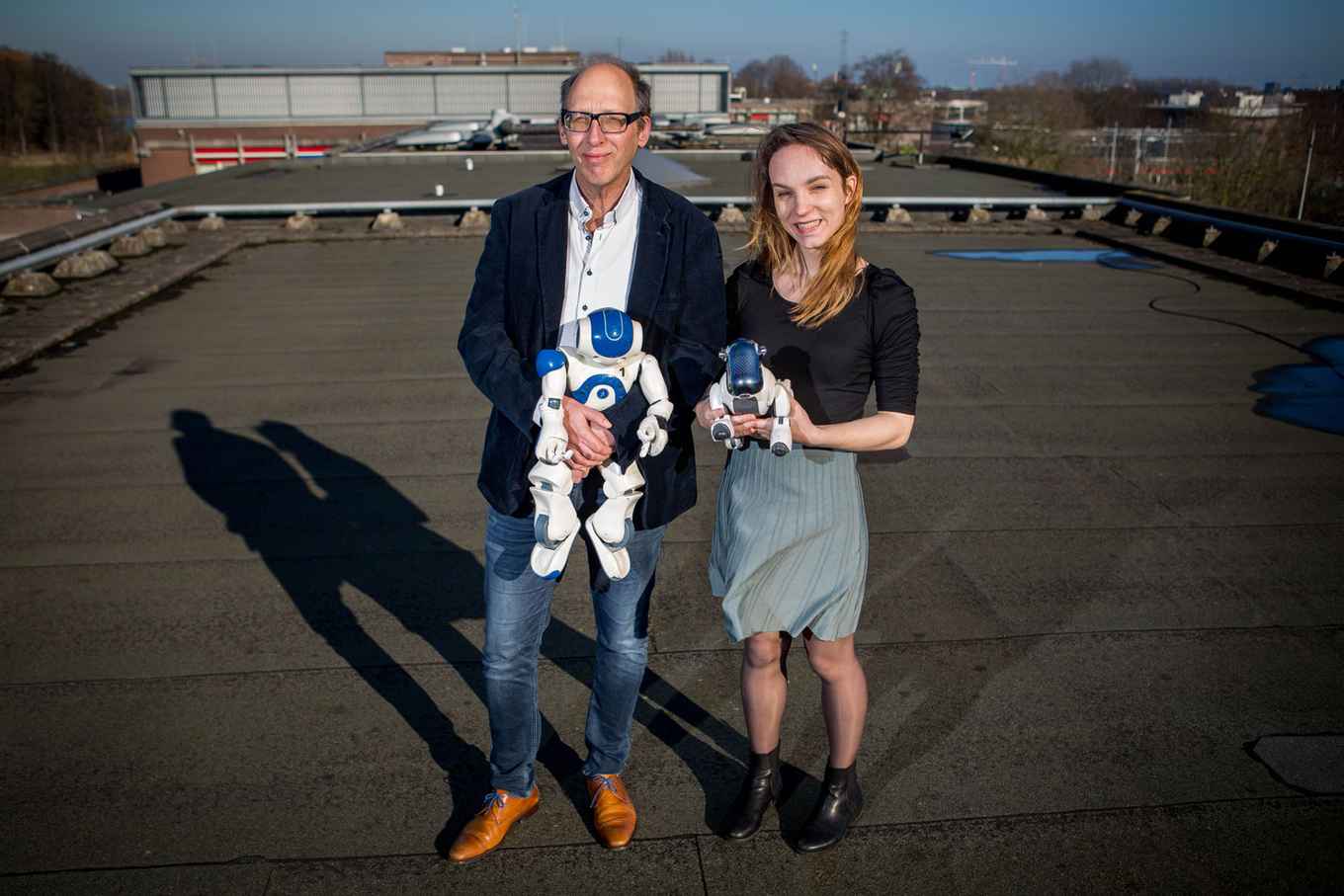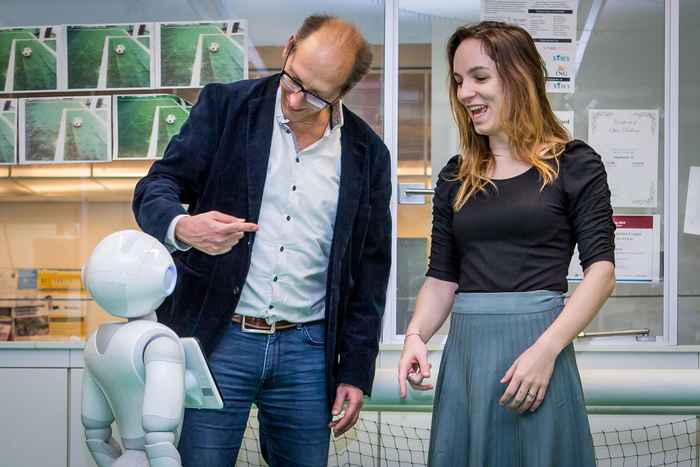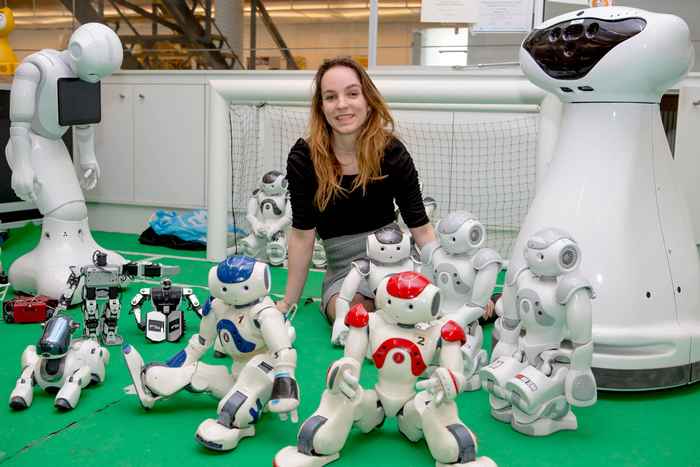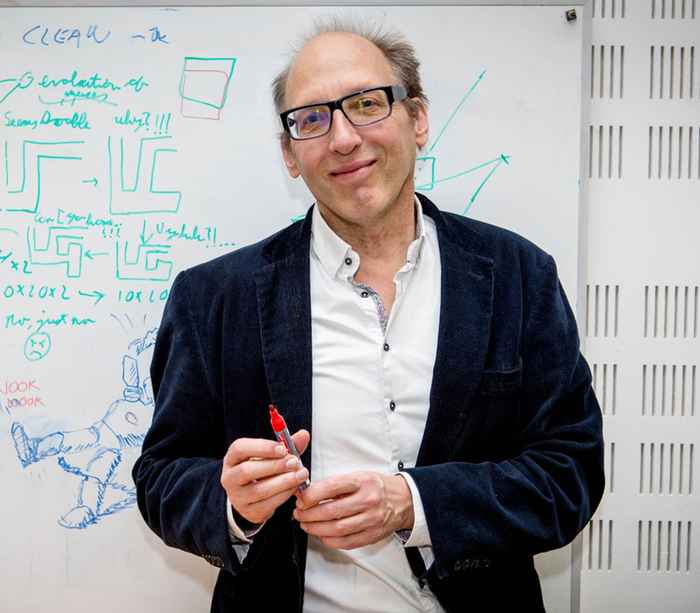20 years Faculty of Science: the past, present and future of Artificial Intelligence
'Computers are getting smarter than people. It’s not a question of whether it will happen, just a question of when.’
31 March 2020

Text: Edda Heinsman. Photography: Liesbeth Dingemans
Very different to ten years ago. Visser still remembers it well. ‘My old robot lab was here. We were so busy getting the robots ready for the football championship that we didn’t even realise it had started to snow. Someone had the idea of testing the robots outside in the snow. We had only trained them for a green pitch, so would they be able to detect the ball in the snow too? And all of a sudden, we were standing outside in the cold with the robots on a white roof – I’ll never forget that.’
Visser saw how his robots explored a new world, how they reacted, for the first time, to a different kind of ground. As it turned out, they were able to deal with it surprisingly well. Would the robot team from back then still have a chance against one of today’s teams? ‘At the time, the ball still had to be orange and the goals yellow or blue. Nowadays, that’s no longer necessary, so the robot team from back then wouldn’t even recognise the goal’, laughs Visser. The robots haven’t actually changed much in terms of appearance, but on the inside, they have grown a whole lot smarter. ‘I think that today’s robots have more capacity by a factor of ten compared with twenty years ago’, estimates Visser. Spijkervet adds: ‘The real progress is in the smart tricks powered by the artificial intelligences. You start by training things like recognising the ball on high-powered computers. This leads to an algorithm that you compress as much as possible, until you’re left with a light variant that works on the robot’s limited computing capacity.’

New buildings
While Spijkervet arranges the aforementioned robots for the photo, Visser points out the buildings that have been constructed in recent years. A huge data centre, student flats, the Amsterdam University College, and of course Science Park 904. ‘The new building will be built on the grass field, and our lab will be over there in the corner,’ says Visser. This new building is certainly no superfluous luxury, as Spijkervet confirms. She was one of the last students to start her pre-Master’s in 2017, which prepared her for the Master’s in Artificial Intelligence. ‘The building was absolutely full. Now, they’ve determined a maximum number of students who are allowed to begin the course and the pre-Master’s has been abolished. Things are actually going too well. They urgently need more space, which is why the new building is being planned.’
Why is this degree programme so popular? ‘The UvA has a good reputation, both in the Netherlands and abroad, with big names such as Max Welling and Maarten de Rijke’, explains Spijkervet. ‘It’s a strong research field’, agrees Visser. ‘We also have a well-integrated business community here at the Science Park. This allows for intensive collaboration, which I find really important. It provides interesting work placement opportunities for students, and ensures that instead of delivering dry research material that just disappears into a drawer, we generate genuinely relevant contributions to societal problems.’

Parking sensor
The first robot tracks in the snow have long since melted, of course; can any physical traces of Visser’s robot research still be found in the building? He pushes open a door on the ground floor, revealing a storeroom full of electronics, screws and bolts. A black-and-white chessboard pattern on the floor. Nothing unusual at first glance. But this floor was installed specially at Visser’s request. ‘My cars were able to navigate well on this floor.’ Visser used a little invalid car to test his software, because nothing bigger would fit into the building. ‘Have you got a parking sensor in your car? Chances are that it uses software that we developed here’, says Visser proudly.
And over in the corner stood a robot, the Oscar4, one of the first in the Netherlands, which is actually still produced by Philips. ‘The PhD student who worked with it was always having disputes with it, and he even got a couple of hefty whacks from it’, says Visser. ‘In the end, the researcher carried on his work with bio-inspired robots at DLR, so maybe his experiences here prompted him to want to make robots safer for humans.’

Impressive army
And now, we take a look at the current robot lab. Spijkervet is the administrator of the machine learning computers in the space. She quickly gathers together a few robots for the photo, conjuring them from all kinds of drawers and corners, and within a few minutes, she has arrayed an impressive army of high-tech toys. A good moment to talk about the future. How will things look twenty years from now? Visser says: ‘Developments in AI are now moving incredibly fast, progressing in leaps and bounds.’ Spijkervet adds: ‘Computers are now better at many tasks, such as recognising malignant tissue in medical screenings. I sometimes wonder whether some professions such as accountant or judge will still exist in the future. I personally don’t think so. Computers are getting smarter than people. It’s not a question of whether it will happen, just a question of when.’
That’s hard to imagine when you see the current selection of robots, which still tend to act rather clumsily. But, according to Visser, this is precisely the problem. ‘People expect everything that happens in AI to be immediately and directly applicable in robotics. But developments here are progressing less rapidly, the gap is growing bigger. The computer is really good at recognising a carrot, but try teaching a robot how to cook: then, you have to know that the carrot is food, that you prepare it in the kitchen. How do you slice the carrot? How does the carrot smell? It’s not just a question of recognising concepts, but also of the accompanying actions. It’s very difficult to translate this to the robot, but on the other hand, it’s great fun to try: more research for us.’
Suddenly, one of the robots pipes up. It’s Pepper: ‘My battery is totally empty, I'm shutting down.’
Also read
- 20 years Faculty of Science: the past, present and future of Biology
-
20 years Faculty of Science: the past, present and future of Biomedical Sciences
Read more information about the Bachelor’s programme Artificial Intelligence and the Master’s programme Artificial Intelligence.
Follow UvA Science on Instagram and Twitter and stay informed of scientific insights and the latest news about the Faculty of Science.